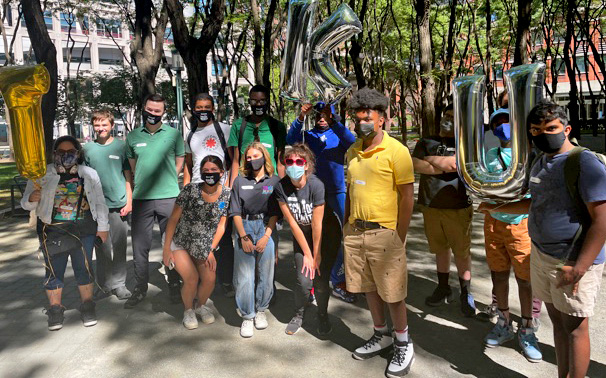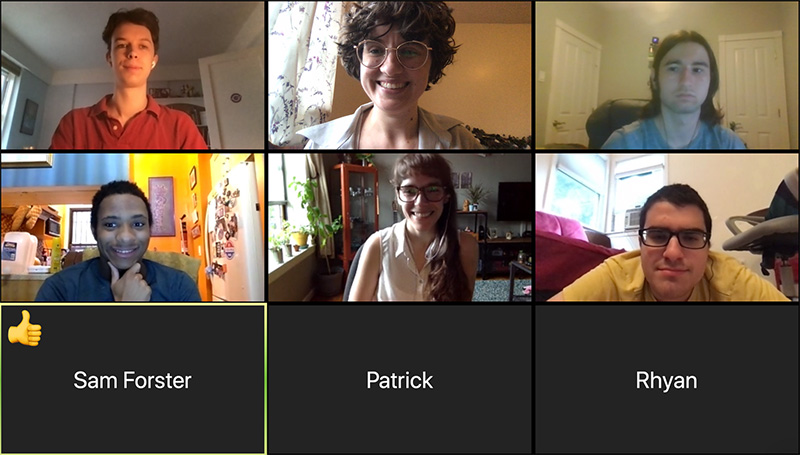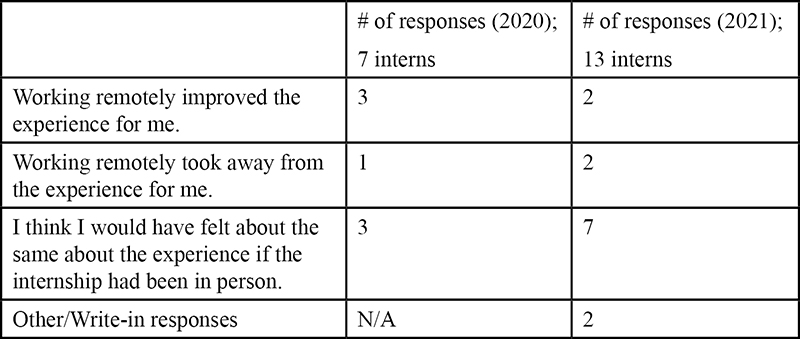Understanding the benefits and challenges associated with technology has always been central at Tech Kids Unlimited, and the COVID-19 pandemic demanded even deeper exploration. Tech Kids Unlimited (TKU) is a NYC-based educational non-profit specializing in teaching technology and computer science thinking to neurodiverse youth, teens, and young adults. TKU taught our first tech workshop for youth in 2009, received 501(c)(3) status in 2014, and has since been ‘growing up’ with our transition-aged students by introducing career-readiness programs such as internships, college access programs, and work-based learning programs that emphasize self-advocacy and soft skills for employment.

TKU students and staff gathered in person for an outdoor social event in September 2021
Piloted in Summer 2020, TKU’s Career Readiness Internship Summer Program (CRISP) was envisioned as a 5-week intensive where interns would spend 2-3 days per week at an external internship site and the balance of time with TKU mentors. CRISP is intentionally structured to provide a mix of explicit instruction in career-readiness skills and abundant opportunities to apply them during internship work. This aligns with findings from Gates, Kang and Lerner’s 2017 study about the efficacy of group-based social skills interventions (GSSI) which reported participants’ increased knowledge of skills but a lack of skill demonstration. The authors recommend that facilitators “provide more opportunities for participants to practice the performance of these learned skills in real situations” (p. 175).
Disrupted but not dissuaded by COVID-19, TKU launched CRISP entirely remotely in Summer 2020 and again in Summer 2021. TKU was well-positioned to adapt to virtual programming – much instruction already took place on screens, staff were well-versed in digital tools, and students have an affinity for technology. We observed unexpected benefits of virtual internships and have considerations for the future.
Running the internship program remotely allowed the inclusion of interns who live outside of NYC or for whom it may not be feasible to travel to their internship site or TKU (located in downtown Brooklyn) for other reasons (familial responsibilities, cost, health issues, etc.). For example, one intern remained on-campus at an upstate NY college during Summer 2020 and was still able to fully participate. Similarly, several interns took family trips during the five weeks of the internship – common during summer recess – and maintained their participation while traveling.

TKU CRISP interns meet over Zoom during the summer 2020 pilot
TKU also worked with a broader group of employers, namely those outside of NYC that interns could not realistically travel to daily. Many CRISP internship placements are with smaller organizations and businesses that have limited resources to supervise in-person interns (e.g., limited workspace or technology for intern use). Facilitating remote internships using Zoom and other digital resources enabled us to include smaller businesses, often with shared interest in improving employment outcomes for neurodiverse people.
Connecting with employers that share TKU’s mission is beneficial to our interns. In a systematic review of studies about employment facilitators and barriers for autistic people, Harmuth et al. (2018) found that “a network of supportive and understanding people surrounding the adult with ASD, including coworkers (e.g., Hudson, 2004), specific support staff (e.g. Friedman, Warfield, & Parish, 2013), family (e.g. Cimera, Wehman, West, & Burgess, 2021), and friends (e.g. Brownlow, 2010), was highlighted as a strong facilitator to employment” (p. 35). This describes the CRISP internship environment: a team of TKU mentors alongside internship supervisors who are well-informed about the strengths, challenges, and interests of each intern.

Working remotely was a mixed experience for interns. During the pilot summer in 2020, 3 out of 7 interns indicated that working remotely improved the experience for them, 1 indicated that it took away from the experience, and 3 indicated that they expected they would have felt about the same regardless of format. In summer 2021, 2 out of 13 interns indicated that working remotely improved the experience, 2 indicated it took away, 7 indicated it would have felt about the same, and 2 named benefits to remote work, but ultimately preferred an in-person experience. One intern noted, “Working remotely was nice for the internship work, but not for the [work-readiness instruction from TKU staff]. If I had to choose I would rather be in person, although I know that wasn’t possible this year.”
Anecdotally, interns named benefits like not needing to travel, comfort in their own space, and flexible scheduling. Harmuth et al. (2018) found that strong responses to sensory stimuli were named as a possible barrier for autistic employees. The way this barrier is described in the study suggests it is largely grounded in a lack of acceptance that could be mitigated by diversity training for neurotypical employees. Still, flexibility to control one’s own sensory diet and schedule could create a more positive and comfortable working environment.
Remote work has the potential to position pre-vocational learners to focus more on core job skills by removing secondary factors that may influence their experience. For example, a long commute, distracting environments like open offices, significant demands for tasks like planning (leaving on time, having transit fare, packing lunch, planning for weather, etc.), or expectations for workplace socializing (e.g. chatting around the water cooler) are all potential stressors that could result in negative feelings about the experience that are wholly unrelated to the job itself. The absence of these factors could allow interns to dedicate more energy to foundational work skills such as communication, time and resource management, and self-advocacy. Hopefully, this period of focused skill-building can increase confidence when entering work environments that introduce additional distractions and demands.
Amidst positives, virtual internships are not without challenges. Special attention must be given to establishing communication expectations since interns cannot visit a colleague’s desk for questions. To replace this informal support system accompanying in-person internships, CRISP interns connected with peers and TKU mentors using the messaging app Slack for timely support. This is an area where exploring additional technologies could be beneficial. It is also important to note that participation in virtual programs requires adequate access to digital devices and high-speed broadband internet, which approximately 30% of K-12 public school students lack in the U.S. (Common Sense Media, 2021).
Looking toward Summer 2022, TKU intends to run a hybrid version of CRISP that offers remote and in-person internship options. This will support our work with a broad community of employers and interns while addressing challenges of remote and in-person programming.
Jessye Herrell is Education Manager at Tech Kids Unlimited. If you would like to learn more about Tech Kids Unlimited, please visit our website at TechKidsUnlimited.org or email us at info@techkidsunlimited.org.
References
Chandra, S., Chang, A., Day, L., Fazlullah, A., Liu, J., McBride, L., Mudalige, T., Weiss, D., (2020). Closing the K–12 Digital Divide in the Age of Distance Learning. San Francisco, CA: Common Sense Media. Boston, Massachusetts, Boston Consulting Group.
Gates, J. A., Kang, E., & Lerner, M. D. (2017). Efficacy of group social skills interventions for youth with autism spectrum disorder: A systematic review and meta-analysis. Clinical Psychology Review, 52, 164–181. https://doi.org/10.1016/j.cpr.2017.01.006
Harmuth, E., Silletta, E., Bailey, A., Adams, T., Beck, C., & Barbic, S. P. (2018). Barriers and facilitators to employment for adults with autism: A scoping review. Annals of International Occupational Therapy, 1(1), 31–40. https://doi.org/10.3928/24761222-20180212-01





